Zoey had a mass removed from her ovary several years ago, but the St. Louis-area native recently had to return to the doctor because she’s in so much pain.
She’s only 5 years old. And that mass they removed from her ovary? She was but 3 weeks old at the time.
Her heartbreaking story is just one of the agonizing tales of the area’s radiation victims from chronic atomic-bomb-era nuclear waste exposure – 11 summaries of which were posted on X last week by Missouri Sen. Josh Hawley.
Such victims may have never been at greater risk than they are now, thanks to Congress.
Hawley’s amendment to reauthorize and expand the 1990 Radiation Exposure Compensation Act (RECA) was stripped out of the National Defense Authorization Act (NDAA) by congressional leaders last month, even after it had handily passed both chambers of Congress.
With just weeks before the 1990 law’s expiration Hawley is urgently trying again to attach the reauthorization to some other bill headed for approval.
Unless he’s successful, he says, “not only will Missourians get nothing, nobody else will get anything and thousands of Americans who have relied on this for lifesaving support will now get nothing. That is not an acceptable outcome.”
Hawley’s bill would not only reauthorize compensation for victims of World War II- and Cold War-era radiation left over from the Manhattan Project to build the world’s first nuclear bomb, but would for the first time include victims of waste buried in the St. Louis region.
“I’m going to make my colleagues face it,” Hawley said in an exclusive interview with The Heartlander. “I’m going to be a real pest on this. I mean, as long as it takes I’m going to be making people vote, forcing this through, until we get it across the president’s desk. That’s what needs to happen here. I’m confident that we will get this enacted and I’m here for it as long as it takes.”
Hawley’s posts represent an extraordinary measure in a desperate mission, an appeal for the public to pressure Congress to take care of the people and their progeny who helped win the war at home while unknowingly sacrificing their health and that of those to come.
“There’s many more. I mean, there are thousands, literally thousands and thousands more,” Hawley says.
“This Oppenheimer movie gets a bunch of attention, and that’s fine. But we really ought to be paying attention to the actual, real-life Americans who are the true heroes here. The true heroes of this story are the people who gave up their health and gave up their lives in order to make the Manhattan Project possible.
“And those are the folks who are in St. Louis and who are in St. Charles and other places around this country who have not gotten the recognition they deserved. And most importantly, they have not gotten the compensation from their government they deserve because the government exposed them to radiation.
“This is a matter of basic fairness and justice, and I am going to fight as long as it takes until the people of Missouri get compensated by their government for the sickness and illness the government forced on them.”
The other poignant stories Hawley told in his posts include:
Mary
“This is Mary. She lived her entire life in St. Louis — went to high school there, met her husband, & raised her family. Just when she decided to go to nursing school, she received a stage 4 lung cancer diagnosis. She died last year, leaving behind her husband and 2 children.”
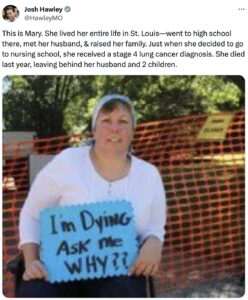
Kirstee
“Meet Kirstee, shown here in a pic held by her mom. Kirstee was diagnosed with a rare childhood brain cancer and died at 13. She was born in an area in St Louis where studies have observed dramatically higher instances of childhood brain cancer.”
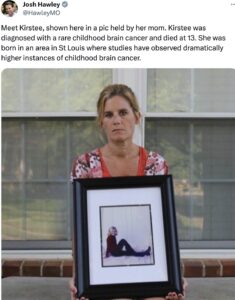
Baby Zach
“Baby Zach was born with a rare brain tumor known to be caused by radiation. He had his first surgery before he was 1 week old. He started chemo at 3 months – and died when he was 6. His mom, Kim, grew up playing in Coldwater Creek in St Louis, site of nuclear contamination.”
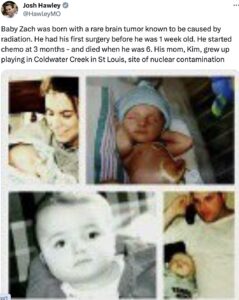
Chantelle
“This is Chantelle, from the St. Louis area. She’s been diagnosed w/ 2 different kinds of breast cancer. She’s had 13 surgeries, including a double mastectomy & full hysterectomy. Her mother & aunt both died of breast cancer.”
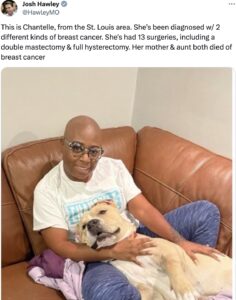
Claire
“This is Claire. Claire’s parents grew up near Weldon Spring, the site of a Manhattan Project uranium refining facility. In 2020, Claire was diagnosed with non-Hodgkin’s Lymphoma. She was 2.”
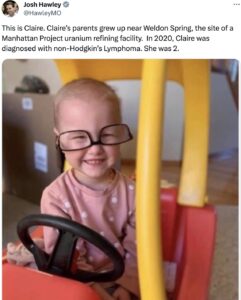
Veda
“This is Claire’s cousin, Veda. Her parents grew up right next to Veda’s parents. And wouldn’t you know it — just 6 weeks after Claire was diagnosed with Lymphoma, Veda was diagnosed with Leukemia. She was 4.”
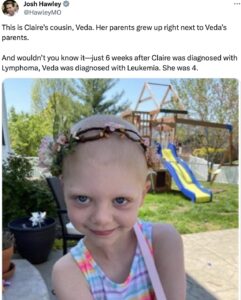
Is getting the federal government to pay attention to these victims and to help them the hardest thing Hawley has ever done as a senator?
“Well, I think it’s one of the most important things.
“I just think that this is such an important fight. You’ve got the government of the United States that does not want to take responsibility for what it’s done – which, you know, is pretty typical. It comes in, it ruins stuff – in this case, people’s lives, exposes them to radiation, lies about it and then says, ‘Oh, but you know, we’re off the hook. We’re busy.’
“Meanwhile, we’ve got unlimited money for Ukraine. Oh, sure, as much money as you want for Ukraine. As much money as you want for foreign aid. But we can’t afford anything for the people of Missouri. That’s ridiculous. That’s just ridiculous. And I am not willing to accept that as a final answer.”
Asked if any of the 11 victims’ stories he posted stood out to him, Hawley says it’s the children, such as Zoey, Claire and Veda.
“Listen, it’s a tragedy when anybody gets sick because of this, what the government has done, but as a father of three young kids, when you look at these little children who are born with these conditions, who are born with cancer or acquire cancer contracted at a very early age and then they lose their hair – they’ve got to spend weeks and months in the hospital.
“Sometimes they lose their lives when they’re 4 or 5 years old. That is wrong. And for the government to do it, that is wrong. And the U.S. government needs to say we take responsibility. We should clean it up. They should clean it up, and they should compensate people for it.”

